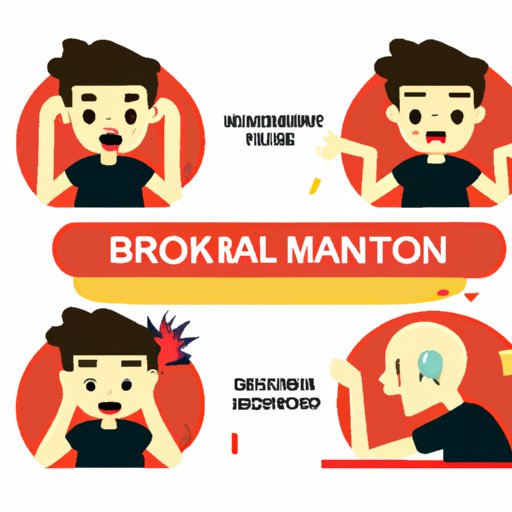
Introduction
Mental breakdowns have become rampant in our society, and it’s essential to understand what they are and how to deal with them. They are a result of a combination of mental and emotional stress that ultimately affects one’s mood, thoughts, and behavior. It’s essential to be aware of mental breakdowns because it can affect anyone- regardless of age, gender, or social status, and can result in a severe condition that needs intervention.
What is a mental breakdown?
A mental breakdown is a general term that describes an array of mental and emotional conditions that result from overwhelming stress. It can also be referred to as an emotional breakdown or a nervous breakdown. Several factors contribute to mental breakdowns, from chronic stress, trauma, chronic disease, anxiety, and depression.
Mental breakdowns are a severe medical condition that should not be taken lightly. Aggravation of a mental breakdown can lead to various life-threatening conditions such as suicidal thoughts and depression if left untreated.
Causes of mental breakdowns
Mental breakdowns are not something that happens overnight. They result from a buildup of stress over a long period. The most common factors that trigger mental breakdowns vary from person to person, and they include:
- Stress: Chronic stress from work, relationships, finances, and other sources of pressure can accumulate and trigger a mental breakdown.
- Trauma: Past experiences, such as abuse, violence, and accidents, can resurface and trigger a mental breakdown.
- Chronic illness: Long-term illness and medical conditions such as cancer, HIV, and diabetes can trigger a mental breakdown. The emotional strain of living with the symptoms and potential for physical deterioration are very demanding.
- Genetics: Some mental health illnesses such as bipolar disorder and schizophrenia are hereditary and can contribute to a mental breakdown.
- Lifestyle: Some bad habits, such as excessive smoking, alcohol and drug addiction, can contribute to mental breakdowns.
It’s essential to identify the factors that contribute to the mental breakdown to help prevent and manage the condition.
Symptoms of a mental breakdown
It’s crucial to note that symptoms can vary from one person to another, depending on the underlying mental health issue. However, there are common signs that one is having a mental breakdown:
- Physical exhaustion: A person with a mental breakdown may feel fatigued and lack energy, causing them to feel physically exhausted. This can be caused by lack of sleep or poor eating habits.
- Poor Concentration: A person may find it hard to concentrate on tasks, which may affect their work or school performance.
- Anxiety: A person may experience severe anxiety with symptoms such as panic attacks, sweating, and rapid heartbeat rate.
- Depression: A person may feel sad and hopeless, with common symptoms such as a loss of interest in things previously enjoyed, difficulty sleeping, and suicidal thoughts.
- Mood swings: A person may experience mood swings such as irritability, agitation, or unexplained anger.
Coping and Preventing a mental breakdown
A mental breakdown can be challenging, but there are several coping strategies that can help individuals manage and prevent the condition:
- Reach out for support: It’s essential to reach out to someone for help during a mental breakdown. Friends, family members, or support groups can prove helpful in offering emotional support, listening to one’s problems, and offering helpful insights.
- Seek professional help: A psychiatrist or a licensed counselor can offer professional help, such as psychotherapy, cognitive-behavioral therapy, or medication.
- Practice self-care: Mental breakdowns may result from neglecting our mental and emotional health. Practicing self-care, such as taking up hobbies, exercising regularly, eating a healthy diet, and getting sufficient rest, can help manage stress levels and assist in preventing a mental breakdown.
- Make lifestyle changes: Making lifestyle modifications such as reducing workload, participating in outdoor activities, limiting alcohol, and drug use, can help to manage and prevent the occurrence of mental breakdowns.
Conclusion
Mental breakdowns are not uncommon, and it’s crucial to be aware of the different contributing factors that can lead to this condition. Awareness of the symptoms can help in identifying the onset of the condition, enabling early treatment. Coping strategies such as seeking support and undertaking self-care measures, as well as making appropriate lifestyle alterations, can assist in preventing and managing the condition. Readers can find support from organizations such as the National Alliance on Mental Illness (NAMI), Mental Health America, The American Psychological Association (APA), etc.




